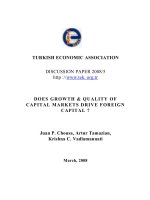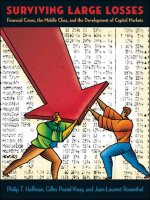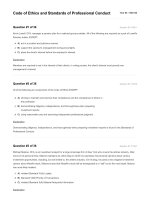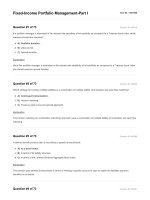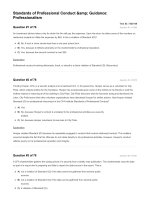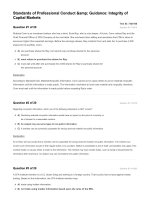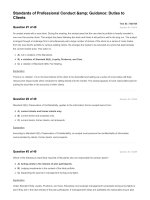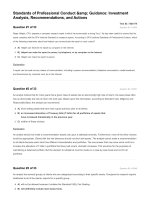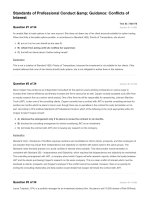Schweser QBank 2017 03 standards of professional egrity of capital markets
Bạn đang xem bản rút gọn của tài liệu. Xem và tải ngay bản đầy đủ của tài liệu tại đây (86.41 KB, 8 trang )
Standards of Professional Conduct & Guidance: Integrity of
Capital Markets
Test ID: 7426160
Question #1 of 20
Question ID: 472615
Roberta Conn is an investment advisor who has a client, Ernie Ray, who is a tax lawyer. At lunch, Conn noticed Ray and the
Chief Financial Officer of CDH Company at the next table. She overhears them talking and ascertains that CDH is about to
announce higher than expected earnings. Before the earnings release, Ray contacts Conn and asks her to purchase 3,000
shares for his portfolio. Conn:
ᅞ A) can purchase shares for Ray, but cannot ever purchase shares for her personal
account.
ᅚ B) must refuse to purchase the shares for Ray.
ᅞ C) must wait until after she purchases the 3,000 shares for Ray to purchase shares for
her personal account.
Explanation
According to Standard II(A), Material Nonpublic Information, Conn cannot act or cause others to act on material nonpublic
information until the information is made public. The information overheard at lunch was material and nonpublic; therefore,
Conn must wait until the information is made public before accepting Ray's order.
Question #2 of 20
Question ID: 412379
Regarding non-public information, which one of the following statements is NOT correct?
ᅞ A) Disclosing material non-public information would have an impact on the price of a security or
be of interest to a reasonable investor.
ᅞ B) An analyst may use some types of non-public information.
ᅚ C) A member can be summarily suspended for having received material non-public information.
Explanation
All of these are true except that a member can be suspended for having received material non-public information. The member can
receive such information as part of their regular duties or by accident. Neither is punishable in and of itself, and penalties only apply if the
member trades or causes others to trade on the information. The member may have certain duties, such as trying to disseminate the
information after receiving it. An analyst may use nonmaterial non-public information.
Question #3 of 20
Question ID: 412383
A CFA Institute member is a U.S. citizen living and working in a foreign country. That country has no laws against insider
trading. Based on this information, the CFA Institute member may:
ᅞ A) trade using insider information.
ᅞ B) not trade using insider information based upon the rules of the SEC.
ᅚ C) not trade using insider information based upon the CFA Institute Standards.
Explanation
CFA Institute Standard II(A) prohibits trading using insider information. A member may not trade using such information
regardless of the rules of the country where he/she lives.
Question #4 of 20
Question ID: 412384
Which one of the following least accurately describes the CFA Institute Standard about using material nonpublic information?
ᅚ A) An analyst using material nonpublic information may be fined by CFA Institute.
ᅞ B) An analyst may use nonmaterial nonpublic information as long as it has been
developed under the Mosaic Theory.
ᅞ C) An analyst may violate this Standard by passing information to others even when it
has been obtained from outside the company.
Explanation
There is no provision for CFA Institute to issue fines to members. Members may not use material nonpublic information for
trading purposes. Nonmaterial, nonpublic information may be used together with analysis of public information under the
Mosaic Theory.
Question #5 of 20
Question ID: 412375
According to CFA Institute Standards of Professional Conduct, which of the following statements about material nonpublic
information is NOT correct? Information is:
ᅞ A) material if reasonable investors would want to know the information before making an
investment decision.
ᅚ B) nonpublic until it has been disseminated to a select group of investors.
ᅞ C) nonpublic until it has been disseminated to the marketplace in general.
Explanation
Standard II(A), Material Nonpublic Information, states that information is "nonpublic" until it has been disseminated to the
marketplace in general as opposed to a select group of investors.
Question #6 of 20
Which of the following is a violation of Standard II(B), Market Manipulation?
ᅚ A) Overstating an earnings projection in order to increase the price of a stock.
ᅞ B) Implementing a trading strategy to exploit differences in market power and
information.
Question ID: 412397
ᅞ C) Engaging in a block trade to limit the effect on the price of a thinly traded security.
Explanation
Standard II(B), Market Manipulation, is not intended to prohibit transactions that are done in order to minimize income taxes or
trading strategies that are not intended to distort prices or artificially inflate trading volume. Overstating earnings projections in
order to increase the price of a stock is a direct violation.
Question #7 of 20
Question ID: 412377
A stockbroker who is a member of CFA Institute has a part-time housekeeper who also works for the CEO of Festival, Inc. One
day the housekeeper mentions to the broker that she saw the CEO of Festival having a conversation at his home with John
Tater, who is a nationally known corporate lawyer and consultant. The stockbroker is restricted from trading on this
information:
ᅚ A) if the housekeeper says the meeting concerned a tender offer and the broker knows
that it is non-public information.
ᅞ B) for both of the reasons listed here.
ᅞ C) only if the broker knows that the meeting is non-public information.
Explanation
Standard II(A), Material Nonpublic Information, states "a member cannot trade or cause others to trade in a security while the
member possesses material nonpublic information" A tender offer would certainly be material nonpublic information. Knowing
that the meeting took place, and nothing else, does not restrict the broker. A reasonable investor would need to know more to
determine if the information was material.
Question #8 of 20
Question ID: 412373
Andrea Waters is an investment analyst who has accumulated and analyzed several pieces of nonpublic information through
her contacts with drug firms. Although no one piece of the information she collected is "material," Waters correctly concluded
that the earnings of one of the drug companies would be unexpectedly high in the coming year. According to CFA Institute
Standards of Professional Conduct, Waters:
ᅞ A) cannot legally invest or make recommendations based on this information.
ᅞ B) may use the information, but only after approval from a compliance officer or
supervisor.
ᅚ C) can use the information to make investment recommendations and decisions.
Explanation
Members who can piece together items of nonmaterial nonpublic information with public information can, based upon the
mosaic theory, use such information for trading purposes.
Question #9 of 20
Question ID: 412398
All of the following are violations of Standard II(B) Market Manipulation EXCEPT:
ᅞ A) securing a controlling interest in an equity security in order to influence the price of a
related derivative instrument.
ᅞ B) disseminating misleading information about the development of new products
and technologies.
ᅚ C) exploiting differences in market inefficiencies.
Explanation
Standard II(B) Market Manipulation prohibits practices that distort prices or artificially inflate trading volumes with the intent to
mislead market participants. The Standard is not intended to prohibit legitimate trading strategies that exploit differences in
market inefficiencies.
Question #10 of 20
Question ID: 412376
A brokerage firm has a trading department and an investment-banking department. Often the investment-banking department
receives material non-public information that would be valuable in advising the firm's brokerage clients. In order to comply with
the Standards, the firm:
ᅚ A) should restrict employee trading in securities for which the firm is in possession of
material non-public information.
ᅞ B) must divest one of the departments.
ᅞ C) should record the exchange of information between the investment-banking
department and the brokerage department.
Explanation
Restricting employee trading in stocks for which the firm has material non-public information is the best answer. Recording the
exchange of information between the two departments is not the best option because there should be no exchange of
information between these two departments. Divesting a department is not a suitable method for addressing this potential
problem.
Question #11 of 20
Question ID: 412381
Which one of the following constitutes the illegal use of material nonpublic information?
ᅞ A) Trading based on your analytical review of the firm's future prospects.
ᅞ B) Trading immediately after attending the firm's annual shareholders' meeting.
ᅚ C) Trading on information your sister, the firm's attorney, told you over dinner.
Explanation
Members may not trade on material nonpublic information; therefore, the information conveyed by the firm's attorney may not
be used by a member for trading purposes.
Question #12 of 20
Question ID: 412387
A CFO who is a CFA Institute member is careful to make his press releases-some of them containing material and previously
undisclosed information-clear and understandable to his readers. While writing a new release, he often has his current intern
proofread rough drafts. He also sends electronic copies to his brother, an English teacher, to get suggestions concerning style
and grammar. With respect to Standard II(A), Material Nonpublic Information, the CFO is:
ᅞ A) not in violation of the Standard.
ᅞ B) only in violation by e-mailing the pre-release version to his brother but not the
intern, because the intern is in essence an employee of the firm.
ᅚ C) violating the standard by either showing the pre-release version to his intern or
sending it to his brother.
Explanation
Standard II(A), Material Nonpublic Information, says that a member must be careful about handling material non-public
information. As a member of CFA Institute, the CFO must limit the people who see important information before it is released.
It would not be appropriate to involve an intern or a relative in the process.
Question #13 of 20
Question ID: 412396
Ron Taylor, a CFA Level I candidate, trades cotton contracts for a small commodity broker. Taylor convinces a government
cotton inspector to issue a warning that the Texas cotton crop is in danger from insect infestation. The price of cotton soars.
Taylor immediately shorts cotton futures. Once the position is created, the government inspector issues a second report
reversing his original opinion and cotton prices plummet.
Cedric Sims, a CFA Level III candidate, would like to generate a tax loss on a security held in his personal portfolio; however,
he believes the security has significant upside potential. To avoid the wash sale provisions of the income tax code, Sims sells
the security and simultaneously creates a synthetic long position using derivatives.
With regard to Standard II(B) Market Manipulation, which of the following statements concerning Taylor's and Sims's conduct
is CORRECT?
ᅞ A) Neither Taylor nor Sims is in violation of Standard II(B).
ᅞ B) Both Taylor and Sims are in violation of Standard II(B).
ᅚ C) Taylor is in violation of Standard II(B), but Sims is not in violation.
Explanation
Taylor is in violation of Standard II(B) Market Manipulation by creating a scheme that caused others to trade on false
information. Sims is not in violation of Standard II(B). The Standard does not prohibit transactions conducted for tax purposes.
Question #14 of 20
Question ID: 412395
Trude Front, CFA, is a portfolio manager. While in the normal course of her duties, she happens to overhear material nonpublic information concerning the stock of VTT Bowser. She purchases several exchange traded funds which contain VTT
Bowser, while shorting similar exchange traded funds which do not contain VTT Bowser. This is most likely:
ᅚ A) a violation of Standard II(A) "Material Non-Public Information."
ᅞ B) only a violation of Standard II(A) "Material Non-Public Information" because
Front is simultaneously shorting the funds which do not contain VTT Bowser.
ᅞ C) not a violation of Standard II(A) "Material Non-Public Information."
Explanation
This is a violation of Standard II(A) "Material Non-Public Information" irrespective of whether Front is simultaneously shorting
the funds which do not contain VTT Bowser. Her trades are motivated by material non-public information.
Question #15 of 20
Question ID: 412382
An analyst provides services for a charitable organization and in return gets free membership in the organization. Part of her
job is to manage the liquid assets of the organization, and those assets include stocks. Her supervisor in the organization calls
her and tells her to buy a certain stock for the portfolio based upon insider information from a board member in the
organization. The analyst objects, but the supervisor says this is what they have always done and sees no reason for changing
now. The analyst complies with the request. With respect to Standards IV(A), Loyalty to Employer, and II(A), Material
Nonpublic Information, the analyst violated:
ᅞ A) only Standard IV(A) requiring duty of loyalty.
ᅞ B) both Standards IV(A) and II(A).
ᅚ C) only Standard II(A) that prohibits insider trading.
Explanation
An employee/employer relationship does not necessarily mean monetary compensation for services. Complying with the
request is a violation of II(A) which prohibits trading on insider information. Standard IV(A) Loyalty deals with going into
business for yourself, leaving an employer and continuing to act in the employer's best interest until their resignation becomes
effective, and whistleblowing which means that the member's interests and their firm's interests are secondary to protecting
the integrity of capital markets and the interests of the clients.
Question #16 of 20
Question ID: 412400
Steve Waters, a CFA Level I candidate, has decided to enter into a long position of Farmco stock. Since Farmco is thinly
traded, Waters is concerned the order will overwhelm the liquidity of Farmco and the price will surge. Waters engages in a
series of block trades in order to accomplish the purchase. According to Standard II(B), Market Manipulation, Waters has
engaged in:
ᅞ A) transaction-based manipulation, but not information-based manipulation.
ᅚ B) neither transaction-based manipulation nor information-based manipulation.
ᅞ C) both transaction-based manipulation and information-based manipulation.
Explanation
Waters is not in violation of Standard II(B), Market Manipulation. Transaction-based manipulation includes, but is not limited to,
transactions that artificially distort prices or volume. Information-based manipulation includes, but is not limited to, spreading
false rumors about a firm in order to induce others to trade.
Question #17 of 20
Question ID: 412399
Mark Williamson is "bearish" on ABC Manufacturing Company. Williamson is so convinced that ABC is overpriced, two weeks
ago, he shorted 100,000 shares. Today, Williamson is "surfing" several popular investment bulletin boards on the internet and
posting false derogatory comments about company management. According to Standard II(B), Market Manipulation,
Williamson has engaged in:
ᅚ A) information-based manipulation, but not transaction-based manipulation.
ᅞ B) transaction-based manipulation, but not information-based manipulation.
ᅞ C) both transaction-based manipulation and information-based manipulation.
Explanation
Williamson is in violation of Standard II(B), Market Manipulation, by engaging in information-based manipulation. Informationbased manipulation includes, but is not limited to, spreading false rumors about a firm in order to induce others to trade.
Question #18 of 20
Question ID: 412385
Don Benjamin, CFA, is the compliance officer for a large brokerage firm. He wants to prevent the communication of material
nonpublic information and other sensitive information from his firm's investment banking and corporate finance departments to
its sales and research departments. The most common and widespread approach that Benjamin can use to prevent insider
trading by employees is the:
ᅚ A) fire wall.
ᅞ B) legal list.
ᅞ C) Wall Street Rule.
Explanation
To comply with Standard II(A), a fire wall provides an information barrier that prevents communication of material nonpublic
information and other sensitive information from one department to another within a firm.
Question #19 of 20
Question ID: 412390
Insider trading can be defined as information that is:
ᅚ A) material and nonpublic.
ᅞ B) nonmaterial and nonpublic.
ᅞ C) material and public.
Explanation
Information is material if it would be important to the investor in their investment making decision. Information is nonpublic if it
is not yet available to the public.
Question #20 of 20
Question ID: 412386
A stockbroker who is a CFA Institute member is called on the telephone by the CEO of a large company. The CEO asks to buy
shares of the CEO's company for the accounts of the CEO's children. In the course of the conversation, the CEO says this will
really pay off when the upcoming takeover goes through. The stockbroker checks her sources and finds no information about
the takeover. In this case the broker should:
ᅞ A) execute the order for all clients as required by Standard III(B), Fair Dealing.
ᅞ B) only execute the order in compliance with Standard III(A), Loyalty, Prudence,
and Care. Since the client is buying the stock for the children, there is not a
problem.
ᅚ C) do neither of the actions listed here.
Explanation
Doing any of these actions would be a violation of Standard II(A), Material Nonpublic Information. Members and Candidates
must not act or induce others to act on material nonpublic information.
